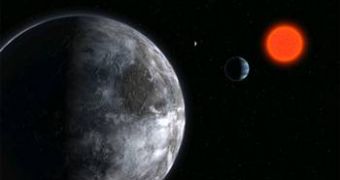Scientists around the world are disappointed, because the extrasolar planet that was the most likely to have liquid water on its surface, the key ingredient for life, has been found to be a boiling world, where water could never exist in its liquid state.
The planet is the most Earth-like ever spotted and was thought to have perfect conditions for water, an essential ingredient for life. Researchers detected the planet orbiting one of Earth's nearest stars, a cool red dwarf called Gliese 581, 20 light years away in the constellation of Libra.
The most Earth-like of them was called Gliese 581c. The team spotted the planet by searching the "habitable zone", the ideal distance to the central star, not too close to be too hot (like boiling Mercury) and not too far to be a frozen wasteland (like Neptune).
Now, it seems that astronomers looked at the right star, but at the wrong planet. After intensive simulations of the climate on Gliese 581c, Werner von Bloh of the Institute for Climate Impact Research in Germany and his team concluded that the planet looks more like Venus.
On this planet, much like on Venus, methane and carbon dioxide created a massive greenhouse effect that warmed the planet so much, that the temperatures on the surface now reach more that 212 degrees Fahrenheit (100 Celsius), boiling away liquid water and with it any promise of life.
The most surprising find is that they were indeed looking at the wrong planet, since the same greenhouse effect may have turned another planet of the same solar system, called Gliese 581d, into a much warmer planet, although it doesn't reside in the "habitable region" around the star. This could mean that, although it's too far from the star to have liquid water on the surface, the greenhouse effect might have compensated, increasing the temperature with just the right amount.
"This planet is actually outside the habitable zone," said Manfred Cuntz, an astronomer at the University of Texas at Arlington and a member of von Bloh's team. "It appears at first sight too cold. However, based on the greenhouse effect, physical processes can occur which are heating up the planet to a temperature that allows for fluid water."

 14 DAY TRIAL //
14 DAY TRIAL //